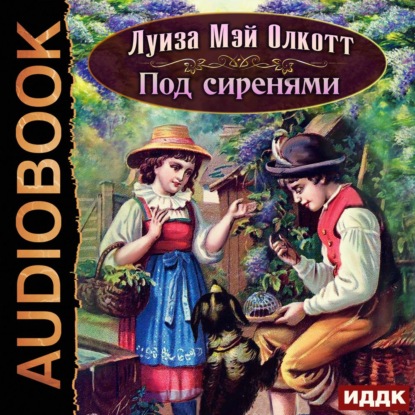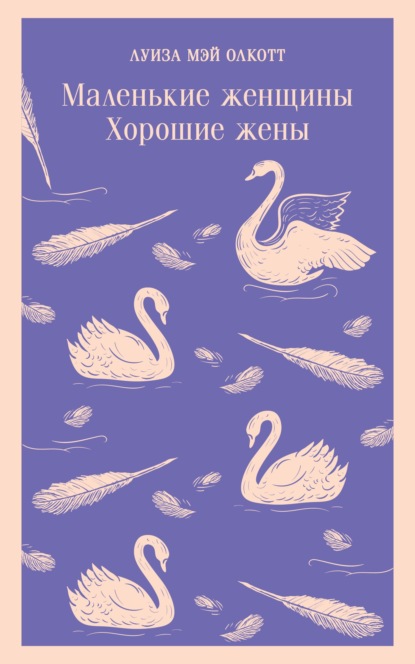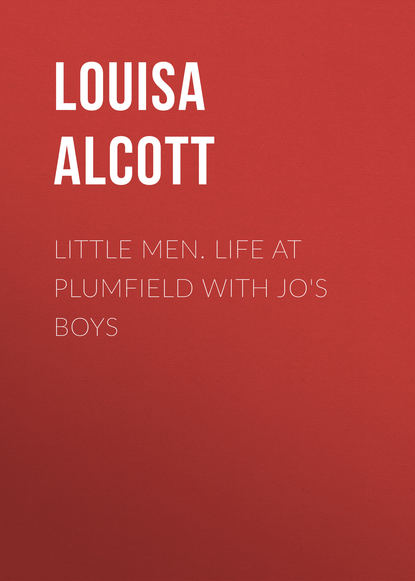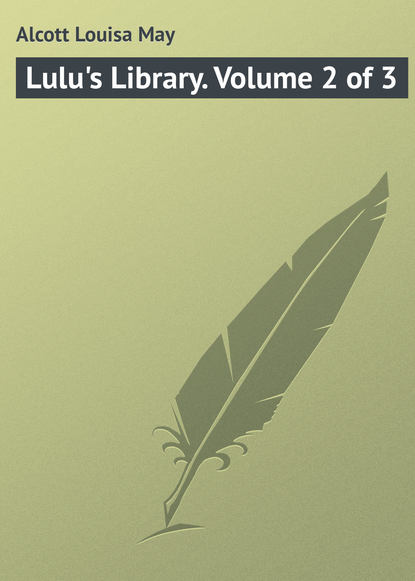 Полная версия
Полная версияПолная версия:
Луиза Мэй Олкотт Lulu's Library. Volume 3 of 3
- + Увеличить шрифт
- - Уменьшить шрифт

Alcott Louisa May
Lulu's Library, Volume 3 (of 3)
I
RECOLLECTIONS OF MY CHILDHOOD
One of my earliest memories is of playing with books in my father's study, – building towers and bridges of the big dictionaries, looking at pictures, pretending to read, and scribbling on blank pages whenever pen or pencil could be found. Many of these first attempts at authorship still exist; and I often wonder if these childish plays did not influence my after-life, since books have been my greatest comfort, castle-building a never-failing delight, and scribbling a very profitable amusement.
Another very vivid recollection is of the day when running after my hoop I fell into the Frog Pond and was rescued by a black boy, becoming a friend to the colored race then and there, though my mother always declared that I was an abolitionist at the age of three.
During the Garrison riot in Boston the portrait of George Thompson was hidden under a bed in our house for safekeeping; and I am told that I used to go and comfort "the good man who helped poor slaves" in his captivity. However that may be, the conversion was genuine; and my greatest pride is in the fact that I have lived to know the brave men and women who did so much for the cause, and that I had a very small share in the war which put an end to a great wrong.
Being born on the birthday of Columbus, I seem to have something of my patron saint's spirit of adventure, and running away was one of the delights of my childhood. Many a social lunch have I shared with hospitable Irish beggar children, as we ate our crusts, cold potatoes, and salt fish on voyages of discovery among the ash heaps of the waste land that then lay where the Albany station now stands.
Many an impromptu picnic have I had on the dear old Common, with strange boys, pretty babies, and friendly dogs, who always seemed to feel that this reckless young person needed looking after.
On one occasion the town-crier found me fast asleep at nine o'clock at night, on a doorstep in Bedford Street, with my head pillowed on the curly breast of a big Newfoundland, who was with difficulty persuaded to release the weary little wanderer who had sobbed herself to sleep there.
I often smile as I pass that door, and never forget to give a grateful pat to every big dog I meet, for never have I slept more soundly than on that dusty step, nor found a better friend than the noble animal who watched over the lost baby so faithfully.
My father's school was the only one I ever went to; and when this was broken up because he introduced methods now all the fashion, our lessons went on at home, for he was always sure of four little pupils who firmly believed in their teacher, though they have not done him all the credit he deserved.
I never liked arithmetic or grammar, and dodged these branches on all occasions; but reading, composition, history, and geography I enjoyed, as well as the stories read to us with a skill which made the dullest charming and useful.
"Pilgrim's Progress," Krummacher's "Parables," Miss Edgeworth, and the best of the dear old fairy tales made that hour the pleasantest of our day. On Sundays we had a simple service of Bible stories, hymns, and conversation about the state of our little consciences and the conduct of our childish lives which never will be forgotten.
Walks each morning round the Common while in the city, and long tramps over hill and dale when our home was in the country, were a part of our education, as well as every sort of housework, for which I have always been very grateful, since such knowledge makes one independent in these days of domestic tribulation with the help who are too often only hindrances.
Needle-work began early; and at ten my skilful sister made a linen shirt beautifully, while at twelve I set up as a dolls' dressmaker, with my sign out, and wonderful models in my window. All the children employed me; and my turbans were the rage at one time, to the great dismay of the neighbor's hens, who were hotly hunted down that I might tweak out their downiest feathers to adorn the dolls' head-gear.
Active exercise was my delight from the time when a child of six I drove my hoop round the Common without stopping, to the days when I did my twenty miles in five hours and went to a party in the evening.
I always thought I must have been a deer or a horse in some former state, because it was such a joy to run. No boy could be my friend till I had beaten him in a race, and no girl if she refused to climb trees, leap fences, and be a tomboy.
My wise mother, anxious to give me a strong body to support a lively brain, turned me loose in the country and let me run wild, learning of Nature what no books can teach, and being led, as those who truly love her seldom fail to be,
"Through Nature up to Nature's God."I remember running over the hills just at dawn one summer morning, and pausing to rest in the silent woods, saw, through an arch of trees, the sun rise over river, hill, and wide green meadows as I never saw it before.
Something born of the lovely hour, a happy mood, and the unfolding aspirations of a child's soul seemed to bring me very near to God; and in the hush of that morning hour I always felt that I "got religion," as the phrase goes. A new and vital sense of His presence, tender and sustaining as a father's arms, came to me then, never to change through forty years of life's vicissitudes, but to grow stronger for the sharp discipline of poverty and pain, sorrow and success.
Those Concord days were the happiest of my life, for we had charming playmates in the little Emersons, Channings, Hawthornes, and Goodwins, with the illustrious parents and their friends to enjoy our pranks and share our excursions.
Plays in the barn were a favorite amusement, and we dramatized the fairy tales in great style. Our giant came tumbling off a loft when Jack cut down the squash-vine running up a ladder to represent the immortal bean. Cinderella rolled away in a vast pumpkin; and a long black pudding was lowered by invisible hands to fasten itself on the nose of the woman who wasted her three wishes.
Little pilgrims journeyed over the hills with scrip and staff, and cockle-shells in their hats; elves held their pretty revels among the pines, and "Peter Wilkins'" flying ladies came swinging down on the birch tree-tops. Lords and ladies haunted the garden, and mermaids splashed in the bath-house of woven willows over the brook.
People wondered at our frolics, but enjoyed them; and droll stories are still told of the adventures of those days. Mr. Emerson and Margaret Fuller were visiting my parents one afternoon; and the conversation having turned to the ever-interesting subject of education, Miss Fuller said, -
"Well, Mr. Alcott, you have been able to carry out your methods in your own family, and I should like to see your model children."
She did in a few moments, – for as the guests stood on the doorsteps a wild uproar approached, and round the corner of the house came a wheelbarrow holding baby May arrayed as a queen; I was the horse, bitted and bridled, and driven by my elder sister Anna, while Lizzie played dog and barked as loud as her gentle voice permitted.
All were shouting, and wild with fun, which, however, came to a sudden end as we espied the stately group before us, for my foot tripped, and down we all went in a laughing heap, while my mother put a climax to the joke by saying with a dramatic wave of the hand, -
"Here are the model children, Miss Fuller!"
My sentimental period began at fifteen, when I fell to writing romances, poems, a "heart journal," and dreaming dreams of a splendid future.
Browsing over Mr. Emerson's library, I found "Goethe's Correspondence with a Child," and was at once fired with the desire to be a second Bettine, making my father's friend my Goethe. So I wrote letters to him, but was wise enough never to send them, left wild flowers on the doorsteps of my "Master," sung Mignon's song in very bad German under his window, and was fond of wandering by moonlight, or sitting in a cherry-tree at midnight till the owls scared me to bed.
The girlish folly did not last long, and the letters were burned years ago; but Goethe is still my favorite author, and Emerson remained my beloved "Master" while he lived, doing more for me, as for many another young soul, than he ever knew, by the simple beauty of his life, the truth and wisdom of his books, the example of a good great man untempted and unspoiled by the world which he made nobler while in it, and left the richer when he went.
The trials of life began about this time, and my happy childhood ended. Money is never plentiful in a philosopher's house; and even the maternal pelican could not supply all our wants on the small income which was freely shared with every needy soul who asked for help.
Fugitive slaves were sheltered under our roof; and my first pupil was a very black George Washington whom I taught to write on the hearth with charcoal, his big fingers finding pen and pencil unmanageable.
Motherless girls seeking protection were guarded among us; hungry travellers sent on to our door to be fed and warmed; and if the philosopher happened to own two coats, the best went to a needy brother, for these were practical Christians who had the most perfect faith in Providence, and never found it betrayed.
In those days the prophets were not honored in their own land, and Concord had not yet discovered her great men. It was a sort of refuge for reformers of all sorts, whom the good natives regarded as lunatics, harmless but amusing.
My father went away to hold his classes and conversations, and we women folk began to feel that we also might do something. So one gloomy November day we decided to move to Boston and try our fate again after some years in the wilderness.
My father's prospect was as promising as a philosopher's ever is in a money-making world; my mother's friends offered her a good salary as their missionary to the poor; and my sister and I hoped to teach. It was an anxious council; and always preferring action to discussion, I took a brisk run over the hill and then settled down for "a good think" in my favorite retreat.
It was an old cart-wheel, half hidden in grass under the locusts where I used to sit to wrestle with my sums, and usually forget them scribbling verses or fairy tales on my slate instead. Perched on the hub, I surveyed the prospect and found it rather gloomy, with leafless trees, sere grass, leaden sky, and frosty air; but the hopeful heart of fifteen beat warmly under the old red shawl, visions of success gave the gray clouds a silver lining, and I said defiantly, as I shook my fist at fate embodied in a crow cawing dismally on a fence near by, -
"I will do something by-and-by. Don't care what, teach, sew, act, write, anything to help the family; and I'll be rich and famous and happy before I die, see if I won't!"
Startled by this audacious outburst, the crow flew away; but the old wheel creaked as if it began to turn at that moment, stirred by the intense desire of an ambitious girl to work for those she loved and find some reward when the duty was done.
I did not mind the omen then, and returned to the house cold but resolute. I think I began to shoulder my burden then and there, for when the free country life ended, the wild colt soon learned to tug in harness, only breaking loose now and then for a taste of beloved liberty.
My sisters and I had cherished fine dreams of a home in the city; but when we found ourselves in a small house at the South End with not a tree in sight, only a back yard to play in, and no money to buy any of the splendors before us, we all rebelled and longed for the country again.
Anna soon found little pupils, and trudged away each morning to her daily task, pausing at the corner to wave her hand to me in answer to my salute with the duster. My father went to his classes at his room down town, mother to her all-absorbing poor, the little girls to school, and I was left to keep house, feeling like a caged sea-gull as I washed dishes and cooked in the basement kitchen, where my prospect was limited to a procession of muddy boots.
Good drill, but very hard; and my only consolation was the evening reunion when all met with such varied reports of the day's adventures, we could not fail to find both amusement and instruction.
Father brought news from the upper world, and the wise, good people who adorned it; mother, usually much dilapidated because shewould give away her clothes, with sad tales of suffering and sin from the darker side of life; gentle Anna a modest account of her success as teacher, for even at seventeen her sweet nature won all who knew her, and her patience quelled the most rebellious pupil.
My reports were usually a mixture of the tragic and the comic; and the children poured their small joys and woes into the family bosom, where comfort and sympathy were always to be found.
Then we youngsters adjourned to the kitchen for our fun, which usually consisted of writing, dressing, and acting a series of remarkable plays. In one I remember I took five parts and Anna four, with lightning changes of costume, and characters varying from a Greek prince in silver armor to a murderer in chains.
It was good training for memory and fingers, for we recited pages without a fault, and made every sort of property from a harp to a fairy's spangled wings. Later we acted Shakespeare; and Hamlet was my favorite hero, played with a gloomy glare and a tragic stalk which I have never seen surpassed.
But we were now beginning to play our parts on a real stage, and to know something of the pathetic side of life, with its hard facts, irksome duties, many temptations, and the daily sacrifice of self. Fortunately we had the truest, tenderest of guides and guards, and so learned the sweet uses of adversity, the value of honest work, the beautiful law of compensation which gives more than it takes, and the real significance of life.
At sixteen I began to teach twenty pupils, and for ten years learned to know and love children. The story-writing went on all the while with the usual trials of beginners. Fairy tales told the Emersons made the first printed book, and "Hospital Sketches" the first successful one.
Every experience went into the caldron to come out as froth, or evaporate in smoke, till time and suffering strengthened and clarified the mixture of truth and fancy, and a wholesome draught for children began to flow pleasantly and profitably.
So the omen proved a true one, and the wheel of fortune turned slowly, till the girl of fifteen found herself a woman of fifty, with her prophetic dream beautifully realized, her duty done, her reward far greater than she deserved.
II
A CHRISTMAS TURKEY, AND HOW IT CAME
"I know we could n't do it."
"I say we could, if we all helped."
"How can we?"
"I've planned lots of ways; only you mustn't laugh at them, and you must n't say a word to mother. I want it to be all a surprise."
"She 'll find us out."
"No, she won't, if we tell her we won't get into mischief."
"Fire away, then, and let's hear your fine plans."
"We must talk softly, or we shall wake father. He's got a headache."
A curious change came over the faces of the two boys as their sister lowered her voice, with a nod toward a half-opened door. They looked sad and ashamed, and Kitty sighed as she spoke, for all knew that father's headaches always began by his coming home stupid or cross, with only a part of his wages; and mother always cried when she thought they did not see her, and after the long sleep father looked as if he did n't like to meet their eyes, but went off early.
They knew what it meant, but never spoke of it, – only pondered over it, and mourned with mother at the change which was slowly altering their kind industrious father into a moody man, and mother into an anxious over-worked woman.
Kitty was thirteen, and a very capable girl, who helped with the housekeeping, took care of the two little ones, and went to school. Tommy and Sammy looked up to her and thought her a remarkably good sister. Now, as they sat round the stove having "a go-to-bed warm," the three heads were close together; and the boys listened eagerly to Kitty's plans, while the rattle of the sewing-machine in another room went on as tirelessly as it had done all day, for mother's work was more and more needed every month.
"Well!" began Kitty, in an impressive tone, "we all know that there won't be a bit of Christmas in this family if we don't make it. Mother's too busy, and father don't care, so we must see what we can do; for I should be mortified to death to go to school and say I had n't had any turkey or plum-pudding. Don't expect presents; but we must have some kind of a decent dinner."
"So I say; I'm tired of fish and potatoes," said Sammy, the younger.
"But where's the dinner coming from?" asked Tommy, who had already taken some of the cares of life on his young shoulders, and knew that Christmas dinners did not walk into people's houses without money.
"We 'll earn it;" and Kitty looked like a small Napoleon planning the passage of the Alps. "You, Tom, must go early to-morrow to Mr. Brisket and offer to carry baskets. He will be dreadfully busy, and want you, I know; and you are so strong you can lug as much as some of the big fellows. He pays well, and if he won't give much money, you can take your wages in things to eat. We want everything."
"What shall I do?" cried Sammy, while Tom sat turning this plan over in his mind.
"Take the old shovel and clear sidewalks. The snow came on purpose to help you."
"It's awful hard work, and the shovel's half gone," began Sammy, who preferred to spend his holiday coasting on an old tea-tray.
"Don't growl, or you won't get any dinner," said Tom, making up his mind to lug baskets for the good of the family, like a manly lad as he was.
"I," continued Kitty, "have taken the hardest part of all; for after my work is done, and the babies safely settled, I 'm going to beg for the leavings of the holly and pine swept out of the church down below, and make some wreaths and sell them."
"If you can," put in Tommy, who had tried pencils, and failed to make a fortune.
"Not in the street?" cried Sam, looking alarmed.
"Yes, at the corner of the Park. I 'm bound to make some money, and don't see any other way. I shall put on an old hood and shawl, and no one will know me. Don't care if they do." And Kitty tried to mean what she said, but in her heart she felt that it would be a trial to her pride if any of her schoolmates should happen to recognize her.
"Don't believe you 'll do it."
"See if I don't; for I will have a good dinner one day in the year."
"Well, it does n't seem right for us to do it. Father ought to take care of us, and we only buy some presents with the little bit we earn. He never gives us anything now." And Tommy scowled at the bedroom door, with a strong sense of injury struggling with affection in his boyish heart.
"Hush!" cried Kitty. "Don't blame him. Mother says we never must forget he's our father. I try not to; but when she cries, it's hard to feel as I ought." And a sob made the little girl stop short as she poked the fire to hide the trouble in the face that should have been all smiles.
For a moment the room was very still, as the snow beat on the window, and the fire-light flickered over the six shabby little boots put up on the stove hearth to dry.
Tommy's cheerful voice broke the silence, saying stoutly, "Well, if I 've got to work all day, I guess I 'll go to bed early. Don't fret, Kit. We 'll help all we can, and have a good time; see if we don't."
"I 'll go out real early, and shovel like fury. Maybe I 'll get a dollar. Would that buy a turkey?" asked Sammy, with the air of a millionnaire.
"No, dear; one big enough for us would cost two, I 'm afraid. Perhaps we 'll have one sent us. We belong to the church, though folks don't know how poor we are now, and we can't beg." And Kitty bustled about, clearing up, rather exercised in her mind about going and asking for the much-desired fowl.
Soon all three were fast asleep, and nothing but the whir of the machine broke the quiet that fell upon the house. Then from the inner room a man came and sat over the fire with his head in his hands and his eyes fixed on the ragged little boots left to dry. He had heard the children's talk; and his heart was very heavy as he looked about the shabby room that used to be so neat and pleasant. What he thought no one knows, what he did we shall see by-and-by; but the sorrow and shame and tender silence of his children worked a miracle that night more lasting and lovely than the white beauty which the snow wrought upon the sleeping city.
Bright and early the boys were away to their work; while Kitty sang as she dressed the little sisters, put the house in order, and made her mother smile at the mysterious hints she gave of something splendid which was going to happen. Father was gone, and though all rather dreaded evening, nothing was said; but each worked with a will, feeling that Christmas should be merry in spite of poverty and care.
All day Tommy lugged fat turkeys, roasts of beef, and every sort of vegetable for other people's good dinners on the morrow, wondering meanwhile where his own was coming from. Mr. Brisket had an army of boys trudging here and there, and was too busy to notice any particular lad till the hurry was over, and only a few belated buyers remained to be served. It was late; but the stores kept open, and though so tired he could hardly stand, brave Tommy held on when the other boys left, hoping to earn a trifle more by extra work. He sat down on a barrel to rest during a leisure moment, and presently his weary head nodded sideways into a basket of cranberries, where he slept quietly till the sound of gruff voices roused him.
It was Mr. Brisket scolding because one dinner had been forgotten.
"I told that rascal Beals to be sure and carry it, for the old gentleman will be in a rage if it does n't come, and take away his custom. Every boy gone, and I can't leave the store, nor you either, Pat, with all the clearing up to do."
"Here's a by, sir, slapin illigant forninst the cranberries, bad luck to him!" answered Pat, with a shake that set poor Tom on his legs, wide awake at once.
"Good luck to him, you mean. Here, What's-your-name, you take this basket to that number, and I 'll make it worth your while," said Mr. Brisket, much relieved by this unexpected help.
"All right, sir;" and Tommy trudged off as briskly as his tired legs would let him, cheering the long cold walk with visions of the turkey with which his employer might reward him, for there were piles of them, and Pat was to have one for his family.
His brilliant dreams were disappointed, however, for Mr. Brisket naturally supposed Tom's father would attend to that part of the dinner, and generously heaped a basket with vegetables, rosy apples, and a quart of cranberries.
"There, if you ain't too tired, you can take one more load to that number, and a merry Christmas to you!" said the stout man, handing over his gift with the promised dollar.
"Thank you, sir; good-night," answered Tom, shouldering his last load with a grateful smile, and trying not to look longingly at the poultry; for he had set his heart on at least a skinny bird as a surprise to Kit.
Sammy's adventures that day had been more varied and his efforts more successful, as we shall see, in the end, for Sammy was a most engaging little fellow, and no one could look into his blue eyes without wanting to pat his curly yellow head with one hand while the other gave him something. The cares of life had not lessened his confidence in people; and only the most abandoned ruffians had the heart to deceive or disappoint him. His very tribulations usually led to something pleasant, and whatever happened, sunshiny Sam came right side up, lucky and laughing.
Undaunted by the drifts or the cold wind, he marched off with the remains of the old shovel to seek his fortune, and found it at the third house where he called. The first two sidewalks were easy jobs; and he pocketed his ninepences with a growing conviction that this was his chosen work. The third sidewalk was a fine long one, for the house stood on the corner, and two pavements must be cleared.





